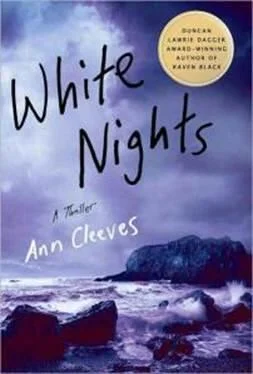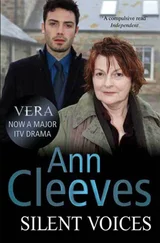‘No,’ Wilding said. ‘But that doesn’t mean they weren’t there.’
‘Apparently Roddy became rather rowdy.’
‘All the same I didn’t notice them. My mind was still elsewhere, inspector.’
‘On your book?’
‘Yes, the book. Of course.’
Standing in the road outside the house, Perez tried to decide what he made of Wilding. What had really brought him here? He couldn’t see Shetland as a natural home for the man. Did he have no friends or family to keep him in the south? There was something unsettling about the intensity of his gaze and the voyeuristic pleasure he took in watching his neighbours.
In her office at the top of the converted textile mill in Denby Dale, West Yorkshire, Martha Tyler was putting together the rehearsal schedule for the week. This show was about bullying. The next would be around racism. Schools didn’t seem interested in hiring the Interact theatre-in-education group to entertain their pupils; there always had to be a message. The young actors with their new degrees in performance rolled their eyes when they saw the scripts, clunky with politically correct jargon, but it was work. They might dream of the Royal Shakespeare Company or a lucrative television ad, but Interact work counted towards their Equity card and the pay kept them in beer.
The company shared the mill with other small businesses – there was a decent wine merchant in the basement, a middle-aged woman who made silver jewellery, and an acupuncturist – but Interact had the whole of the top floor. One big space for rehearsals, a couple of offices and a small room with a microwave and a kettle where they took their breaks. This wasn’t one of the smart conversions that had taken place in other parts of Kirklees. The mill was a rackety jumble of stairways and levels. The floors were uneven and the windows leaked.
Two of the actors had already arrived. Martha could hear them in the tea room, sharing stories of a nightmare tour of Hull which had become apocryphal – the teacher who’d had a breakdown in the middle of a performance, kids pulling knives, a pregnant fourteen-year-old who claimed to have gone into labour. All exaggeration. That was the trouble with people in the theatre business. They began to believe their own fictions. You could never tell where the acting stopped. That made her think of Jeremy. If you believed all his stories, he’d travelled the world, acted with Olivier and made love to at least half a dozen minor Hollywood film stars. She didn’t believe a word, of course. Why would anyone like that end up running a crummy theatre-in-education company in West Yorkshire?
Martha checked her mobile phone. Still no call from him. What had started out as mild irritation had changed to anger and now to concern. Jeremy was an arrogant prat and a congenital liar, but he made his living from Interact and he cared about its reputation. Martha was at the company as part of a higher apprenticeship in arts management. After taking a good degree in drama from Bristol, the apprenticeship seemed a better option than an MA. There was a modest bursary and the chance for hands-on experience. Jeremy was taking the piss, of course. Her placement at Interact wasn’t supposed to provide him with an unpaid skivvy, yet it wasn’t unusual for him to disappear for a couple of days, leaving her in charge.
‘It’s great practice, love. Think how it’ll look on your CV.’
But he’d been away for four days now and she hadn’t heard anything. She’d tried his mobile, but it seemed to be switched off.
She tried to remember exactly what he’d said this time. They’d been in the pub the week before, the end of a debrief on the drugs-awareness tour of the Midlands. For once he’d been almost generous, had bought a couple of rounds for the actors. There’d been a suppressed excitement about him. She’d come in from Huddersfield on the train, so she’d been drinking too. Somehow she’d found herself sitting at a small table next to him. The rest of the group had been drinking all afternoon and were singing some dreadful song from the show. She’d had a struggle to make out what Jeremy had been saying.
‘Something’s come up, love. A great chance. You can cope on your own for a bit, can’t you? A girl with your talents. I’ll pay you, make it worth your while.’
She’d thought perhaps it was an audition. She’d worked around actors enough to recognize the excitement that came out of the possibility of a part, the part that would change a career. Even actors as old as Jeremy fell under the magic, lost all their reason. She couldn’t understand it herself. She’d never been bitten by the acting bug. Jeremy told everyone that performance was his first love. He’d set up Interact to pay the bills and because the rent on the mill was subsidized for the first year, but made it clear that if the right offer came his way he’d wind up the company like a shot. There were always deals in the offing. A friend who worked for Granada was planning a soap which had a part just right for him. He’d bumped into a script editor who thought he was perfect for the lead in a ninety-minute drama. None of these possibilities ever came to anything.
Martha had never seen Jeremy act, but she had watched him lead rehearsals. She thought he probably was a bit better than the average jobbing actor. He held her attention, and anyone who could bring those dreadful lines to life must have some skill. But theatre was all about luck and if it hadn’t happened for Jeremy by now, she thought it was hardly likely to. If he’d been to an audition, even in London, he should have been home days ago. If he’d set his heart on a part, failed to get it and been drowning his sorrows, he should be back by now. If by some remote chance he’d been given the part, he’d want to tell them all. So where was he?
There were footsteps on the bare wooden stairs. She looked out through the open office door, hoping to see Jeremy leaping up, two steps at a time. For someone who drank so much he was remarkably fit. But it was Ellie, another of the actors. Martha looked at her watch. Ten more minutes and she’d have to start the rehearsal without him.
By late afternoon she knew she wouldn’t get any more out of the team. She’d always wanted to direct. A natural bossiness, her friends said. But even in university, working on small student productions, direction had been more rewarding than this. Only one of the actors had done more than glance at the script. There was little scope for characterization. At least by now she’d blocked in the moves and helped them put some meaning into the words. There wasn’t much else she could do until they’d learned the lines. She sent them home with threats and bribes. In the office she checked her mobile again. Still no message.
She wasn’t sure what she could do, who she should tell about Jeremy’s disappearance. He lived alone. She had an idea that he might have been married once, but he didn’t talk about children. He lived in Denby Dale in a little terraced house close to the mill. Everyone in the village knew him, but she didn’t think he had any close friends. The regulars in the Fleece chatted to him most evenings, but she doubted they had any more idea about his private life or background than she did.
It didn’t occur to her to go to the police. Jeremy wouldn’t want anyone prying into the business. She thought he probably sailed very close to the wind when it came to VAT and health and safety. She knew he paid some of the actors cash in hand. Besides, it was ridiculous. He’d said he’d be away for a few days. He hadn’t yet been gone for a week. All the same she hated the feeling of helplessness. She wished he would phone her.
The actors had gone back to the digs in the village where they stayed when they were rehearsing. None of them was local. Jeremy employed different actors for each tour. Martha locked up the office and on the keyring saw the spare key to Jeremy’s house. He’d given it to her when he’d asked her to stay there one morning to let in the plumber – the sort of work experience not set out in the apprenticeship job description. She’d offered it back to him, but he’d told her to hang on to it.
Читать дальше












